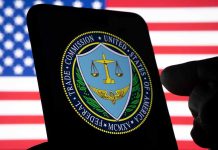
Here’s the HTML-formatted article based on the provided information:
A Turkish American electrical engineer with top-secret clearance has been arrested by the FBI for unauthorized possession of classified documents, raising critical questions about national security and counterintelligence efforts.
At a Glance
- Gokhan Gun, a Department of Defense civilian engineer, was charged with unauthorized removal and retention of classified material
- Gun, a dual U.S.-Turkish citizen, allegedly printed and removed over a dozen classified documents from his workplace
- FBI agents recovered classified documents, including those marked Top Secret, from Gun’s residences and vehicle
- Gun faces a maximum penalty of five years in prison if convicted
FBI Uncovers Classified Document Breach
In a startling development that has sent shockwaves through the national security community, the FBI has arrested Gokhan Gun, a Department of Defense civilian electrical engineer, on charges of unauthorized removal and retention of classified material. Gun, a dual citizen of Turkey and the United States, held a Top Secret security clearance with access to Sensitive Compartmented Information (SCI), making this breach particularly concerning for U.S. officials.
According to the Department of Justice, Gun allegedly began printing and removing classified documents from his workplace without permission as early as May 2024. Over the course of several months, he printed more than a dozen classified documents, raising red flags within the security apparatus.
Arrest and Evidence Recovery
The FBI’s investigation culminated on August 9, when agents executed search warrants on Gun’s residences in Fairfax and Falls Church, Virginia, as well as his vehicle. The timing was critical, as Gun was scheduled to fly to Mexico that same day. During the searches, agents recovered multiple documents with classification markings, including those labeled Top Secret and SCI.
Among the items recovered was a Top Secret document found in Gun’s backpack, along with a printout listing his security clearances. Perhaps most alarmingly, Gun had his U.S. passport and an expired Turkish passport packed for travel, raising questions about his intentions.
Legal Proceedings and National Security Implications
Following his arrest, Gun faced a preliminary hearing where prosecutors argued for his continued detention, citing potential additional charges under the Espionage Act if evidence showed intent to disseminate documents to a foreign power. However, U.S. Magistrate Judge Ivan Davis ruled that there was insufficient evidence linking Gun’s planned trip to Mexico with the mishandling of documents.
As a result, Gun was allowed to remain free pending trial, subject to home detention and GPS monitoring. If convicted, he faces a maximum penalty of five years in prison and a $250,000 fine, though actual sentences are typically less severe.
Background and Ongoing Investigation
Gun’s background has come under intense scrutiny. Born in Istanbul, Turkey, he arrived in the U.S. on a work visa in 2001, became a lawful permanent resident in 2012, and was naturalized as a U.S. citizen in 2021. His role as an electrical engineer with the Joint Warfare Analysis Center, combined with his Top Secret security clearance, has raised concerns about the potential compromise of sensitive information.
The FBI’s investigation is ongoing, with particular focus on Gun’s international travel history. Over the past two decades, Gun has taken 15 overseas trips, including seven to Turkey. Authorities are also examining his multiple properties in Virginia, Texas, and Florida for any connections to the classified materials.
As this case unfolds, it serves as a stark reminder of the ongoing challenges in safeguarding classified information and the critical importance of robust counterintelligence efforts to protect national security interests.










